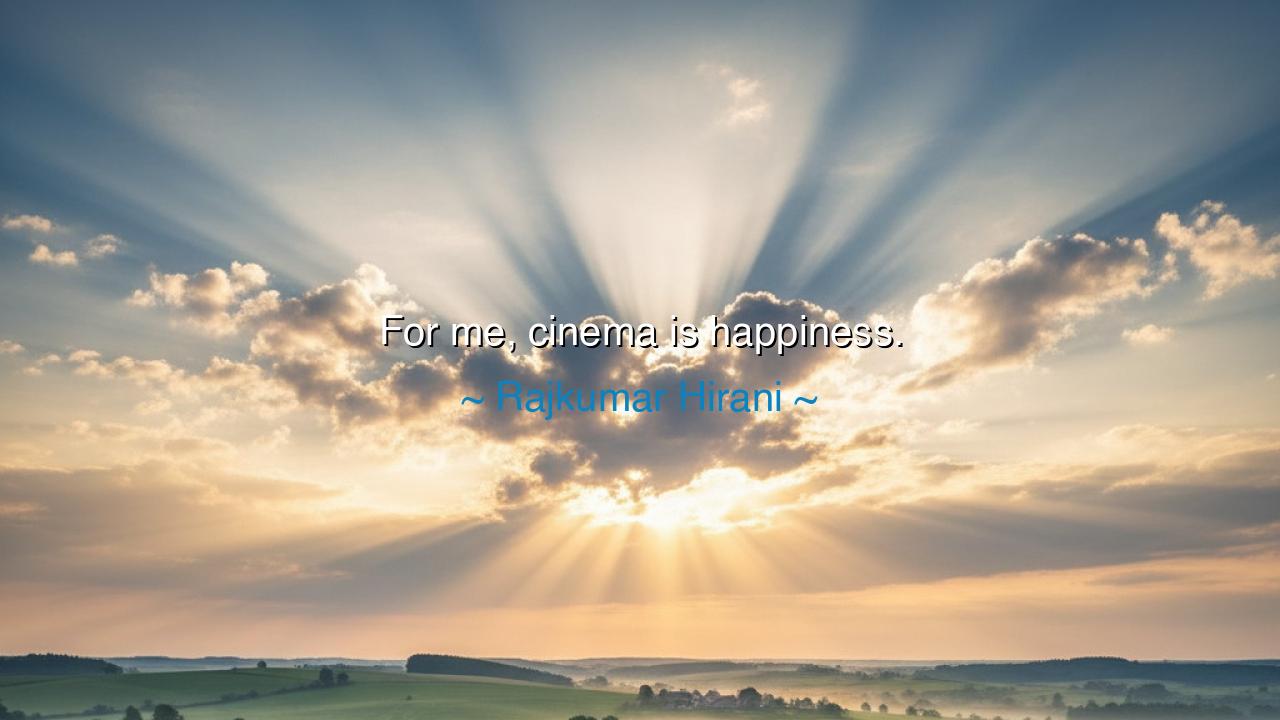
For me, cinema is happiness.






“For me, cinema is happiness.” Thus declared Rajkumar Hirani, a storyteller of our age, whose films have touched the hearts of millions with laughter, tears, and hope. In this brief but radiant phrase, he speaks not only of his craft but of the eternal bond between art and joy — the mysterious power of creation that uplifts both the maker and the beholder. To Hirani, cinema is not merely entertainment or profession; it is a vessel of happiness, a sacred mirror reflecting the struggles and triumphs of humankind, and transforming pain into beauty. Through it, he reveals the truth that art, when born of compassion, becomes a light in the darkness — not an escape from life, but an embrace of it.
The origin of this quote lies in Hirani’s lifelong devotion to storytelling — a devotion that bridges humor and humanity. In his films such as Munna Bhai M.B.B.S., 3 Idiots, and PK, he has sought not only to entertain but to awaken — to remind his audience that life, even in its absurdities and imperfections, is filled with grace. His cinema, rooted in warmth and moral clarity, celebrates the simple virtues of kindness, forgiveness, and love. When he says, “cinema is happiness,” he speaks from the soul of a creator who has seen art heal hearts, bridge divisions, and restore faith in humanity. For him, happiness is not a possession but a feeling born through connection — and cinema is the thread that weaves those connections between people, across languages and lives.
To say that cinema is happiness is to understand that storytelling itself is an act of salvation. From the dawn of time, humankind has gathered around the fire to tell tales — stories of gods and heroes, of love and loss, of laughter and survival. In every age, this act has brought joy, not merely because it entertains, but because it reminds us that we are not alone in our hopes and sorrows. In cinema, this ancient ritual lives anew — light and sound joining to reveal the shared rhythm of the human heart. Thus, for Hirani, every film becomes a prayer to joy — a way to remind his audience, and himself, that even amid despair, laughter and meaning endure.
Consider, for example, the story of Charlie Chaplin, the great silent comedian whose life itself was shadowed by poverty and pain. Orphaned young, he rose from the depths of hardship to become the world’s greatest bringer of laughter. Through his films, he transformed the struggles of the poor and the lonely into moments of humor and humanity. For Chaplin, as for Hirani, cinema was not an escape from sorrow — it was the transformation of sorrow into happiness. His laughter was not lighthearted forgetfulness, but a deep and defiant affirmation of life. He once said, “To truly laugh, you must be able to take your pain, and play with it.” So too does Hirani, whose stories carry the same wisdom — that even in imperfection, there lies joy.
Cinema, as Hirani understands it, is not merely art; it is empathy made visible. It allows one heart to touch another across distances of time and culture. When he calls it happiness, he honors the sacred truth that creation, when born from love, brings healing to both creator and audience. For the artist, it is the joy of expression — the act of giving form to what the soul feels. For the viewer, it is the joy of recognition — the discovery of oneself within another’s story. Thus, cinema becomes a bridge between hearts, a conversation without words, a reminder that beneath the noise and difference, humanity is one.
But this quote carries a deeper message as well — that each person must find their own form of cinema, their own source of happiness. For Hirani, it is storytelling; for others, it may be music, teaching, building, or simply serving others. The lesson is not that everyone must love film, but that everyone must love something deeply, sincerely, and selflessly. Happiness, as he reminds us, is not found in possessions or status, but in the act of creation, in doing that which fills the heart with meaning. To live without such purpose is to move through life as a shadow; to live with it is to shine, however briefly, like the sun.
Therefore, my children, heed the wisdom hidden in this simple truth: “For me, cinema is happiness.” Seek your own cinema — that craft, that passion, that calling which makes you feel alive. Pour yourself into it not for wealth or fame, but for the quiet joy of creation, for the chance to add even a drop of beauty to the world. Do not fear imperfection, for happiness is not found in perfection but in participation — in the courage to give your heart to something greater than yourself.
And remember this always: Happiness is not something to be pursued like a trophy, but something to be lived like a story. Rajkumar Hirani’s cinema teaches us that joy, like film, is made of light and shadow — that even pain, when met with laughter and love, can become art. So, live as an artist, whatever your path may be. Let your life itself be your cinema — a creation of courage, compassion, and joy. For in the end, it is not the applause that matters, but the quiet happiness of knowing you gave your soul to something beautiful.






AAdministratorAdministrator
Welcome, honored guests. Please leave a comment, we will respond soon